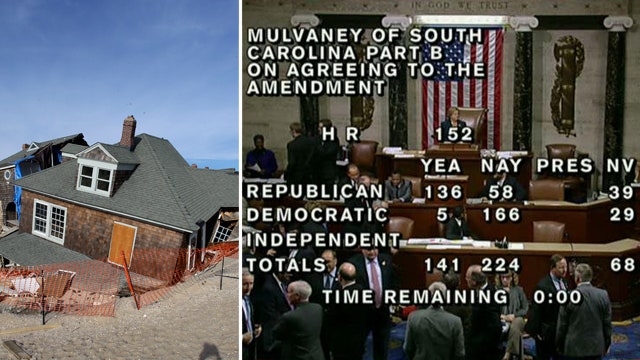This is a rush transcript from "Your World," January 15, 2013. This copy may not be in its final form and may be updated.
NEIL CAVUTO, HOST: He just lost 258-162, my next guest's amendment easily failing in the House of Representatives. And all it wanted to do was pay for some of this Sandy aid package. Perish the thought.
South Carolina Republican Congressman Mick Mulvaney says it was all about protecting taxpayers, all taxpayers.
What you wanted to essentially do, Congressman, to bring people up to speed, is match dollar for dollar whatever emergency aid we provide in Sandy. And I think, as you pointed out in a prior interview, since it is likely we could run into more of these storms, it might be a practice we might want to start putting into place sooner than later. Your colleagues disagreed. What do you make of that?
REP. MICK MULVANEY, R - S.C.: Well, I think there are a couple of things you can say about it.
First of all, to your second point about doing it differently in the future, yeah, we need to start having a rainy-day fund. We need to start budgeting for these things. People say there is no way to predict particular natural disasters. But there is a way to say, look, we pretty much have them every single year. Why aren't we budgeting for them in a larger amount on a proactive basis?
(CROSSTALK)
CAVUTO: But then their argument is you would have to really budget a lot. If there are going to be storms of Sandy's heft -- this was $60 billion.
I never know and I think you prior pointed out here you never know how they came up with that figure. But, nevertheless, they did.
MULVANEY: Right.
CAVUTO: And if all storms are like that, there is not a contingency fund in the world big enough for that. So, what do you do?
MULVANEY: The vote today was $17 billion. We're not finished with this yet.
CAVUTO: Understood. Understood.
MULVANEY: There is going to be another vote later on this afternoon for the $33 billion.
But let's assume that they are all going to be $60 billion. Does that mean that we are all going to -- we just are not going to set anything aside for them? Are we not going to talk about offsets? We did talk about offsets for Katrina. That is something that has gotten lost in this discussion over the course of the months following Katrina, that we actually offset or rescinded 40 percent of those costs.
There is precedent for this. I do wish that it had passed today because then I could have supported the underlying bill. But I was just appreciative of the opportunity to at least make the debate and have the argument and say, look, we have to start paying for these things. It is not right that we borrow money from China so that we can take care of our own folks in need in the Northeast.
CAVUTO: Well, in this case, we borrow money from China to pay China.
But, having said that, I am wondering, Congressman, you were willing to take on the likes of Chris Christie of New Jersey and others who criticized you and your colleagues for playing games with aid, Sandy aid. How do you feel about that?
MULVANEY: Well, I think Chris Christie's objections to it were different. I think he was upset very much with the delay. And I can't argue with him on that.
I think we should have had a vote on this before the end of last year. But that is water under the dam. I can't imagine that Mr. Christie would attack me for simply wanting to pay for it. In fact, it sounds like it's something that he might otherwise support. This wasn't done in the terms of delay.
It was not done in order to try and kill the bill. It was a very straightforward argument, how are we going to pay for it? I think Chris Christie, of all people, would appreciate that.
CAVUTO: So, real quickly, in the final aid package that comes up in follow-up tranches today -- and I guess by tonight, we will be done with everything -- will you vote for it?
(CROSSTALK)
MULVANEY: No.
I am pretty certain that the last amendment tonight will pass, taking this to $60 billion.
CAVUTO: Wow.
MULVANEY: It will ultimately include the things like Alaska fisheries, things in North Carolina that were damaged years ago, job placement programs, legal services, the roof on the Smithsonian, weather balloons and satellites.
That's going to probably end up in the bill tonight. And that's unfortunate. And I will have to vote against it.
CAVUTO: It is. It is unfortunate, because it robs the very people who needed the money, the money.
MULVANEY: And I think that's the risk here, Neil...
CAVUTO: Gotcha.
MULVANEY: ... is that people are worried that they are not going to get the money.
CAVUTO: Congressman, very good having you. Thank you.
MULVANEY: Thanks, Neil.
Content and Programming Copyright 2013 Fox News Network, LLC. ALL RIGHTS RESERVED. Copyright 2013 CQ-Roll Call, Inc. All materials herein are protected by United States copyright law and may not be reproduced, distributed, transmitted, displayed, published or broadcast without the prior written permission of CQ-Roll Call. You may not alter or remove any trademark, copyright or other notice from copies of the content.






















